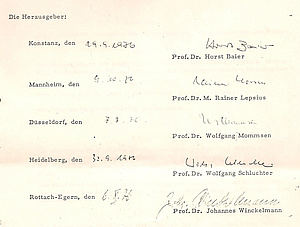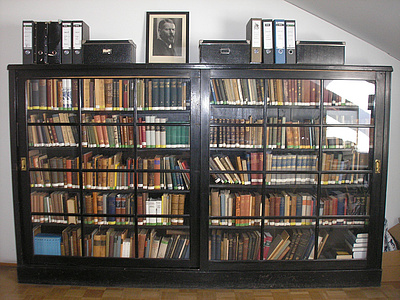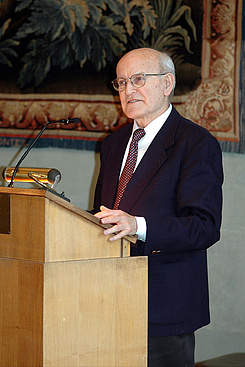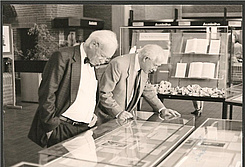
A Complex and Successful Arrangement
In December 1975, three partners agreed on a cooperation through which the historical-critical edition of Max Weber's writings, speeches, letters and lectures was founded and placed on a secure basis for decades: the editorial board, having co-opted itself, the Commission for Social and Economic History with the Bavarian Academy of Sciences and Humanities and the publishing house J.C.B. Mohr (Paul Siebeck) in Tübingen. The contract was signed by the responsible persons in September and October 1976.
Preparations begin in 1973

The Editorial Board takes responsibility for the Max Weber Complete Edition’s structure and classification, the installation of volume publishers and the edition’s design. Via the Commission for Social and Economic History the Academy provides the organizational umbrella, the premises and economic resources for a coordinating office as well as the position of the editor-in-chief. Since 1996 the Academy also serves as applicant for the Academies’ Programme funding. The publishing house provides printing rights and printing without any contribution towards printing costs. The editing is decentralized in different locations depending on the places of employment of the respective volume editors.
This complex arrangement was put in place back in 1973, and initiated by Horst Baier together with Wolfgang J. Mommsen and Johannes Winckelmann. M. Rainer Lepsius and Wolfgang Schluchter also joined the team. The project received important support from Hans Maier, then Bavarian Minister of Education and Cultural Affairs, Hans Raupach, President of the Bavarian Academy of Sciences and Humanities, and Karl Bosl, Chairman of the Commission for Social and Economic History.
Joint Decision Making from Start to Finish


The arrangement finalised in 1975 has served the project well to this day. Decisions were made jointly by the Editorial Board and depended on both the mutual respect and the continuity of long service by the Board members. In 1975 M. Rainer Lepsius, the managing editor, was co-opted into the Academy’s Commission for Social and Economic History. Knut Borchardt, the Commission’s chairman from 1974 until 2013, put great effort into achieving the Edition’s acceptance into the Academies’ Programme and became a volume editor himself. For many years Edith Hanke has managed the chief editing office since 2005. Publisher Georg Siebeck has committed himself to the Max Weber Complete Edition from the very beginning.
Reference: E. Hanke/G. Hübinger/W. Schwentker, „The Genesis of the Max Weber Gesamtausgabe and the Contribution of Wolfgang J. Mommsen“, in: Max Weber Studies 12.1 (2012), p. 59-94.
The Edition set itself the task of editing the bulk of writings in chronological order within thematic contexts (pertinences). Volumes had then to be defined and selected according to major themes. 24 academics were asked to become Volume Editors. The members of the Editorial Board took on 22 volumes themselves, supported by numerous academic staff members.
Documentation of the edition history
Edition materials of the working centers

After the funding from the academy program was completed at the end of 2015, the Max Weber working centers (Max Weber-Arbeitsstellen) in Düsseldorf and Heidelberg were closed. The edition materials were brought to the Bavarian Academy of Sciences and Humanities in large moving boxes and are now in the research documentation area. These are copies of texts and letters with the associated transcriptions, photographs, research on people and facts in Max Weber's environment - i.e. documents that were necessary to create the MWG volumes. This also includes the systematic recording of correspondence according to letter recipients, chronology and archive locations. The index boxes prove that an excellent "analog" system already existed in the pre-digital world. Since 2008, this has taken over the letter database created for the letter edition.
After the death of the editor Horst Baier, the working materials from the Max Weber working center in Konstanz were also brought to Munich in the summer of 2018. In addition to research into Max Weber's biography, this also included preparatory work on the edition of Max Weber's methodological writings and a collection of rare publications about Max Weber. The three Max Weber centers were founded by to the editors Wolfgang J. Mommsen (Düsseldorf), M. Rainer Lepsius and Wolfgang Schluchter (Heidelberg) and Horst Baier (Konstanz). The materials brought to Munich therefore also contain correspondence between the editors, minutes of meetings, plans, funding applications, etc. These form important additions to the files of the Munich office of the MWG. These materials should be recorded in accordance with the applicable archive regulations and be available for future research on the MWG's editorial history.
